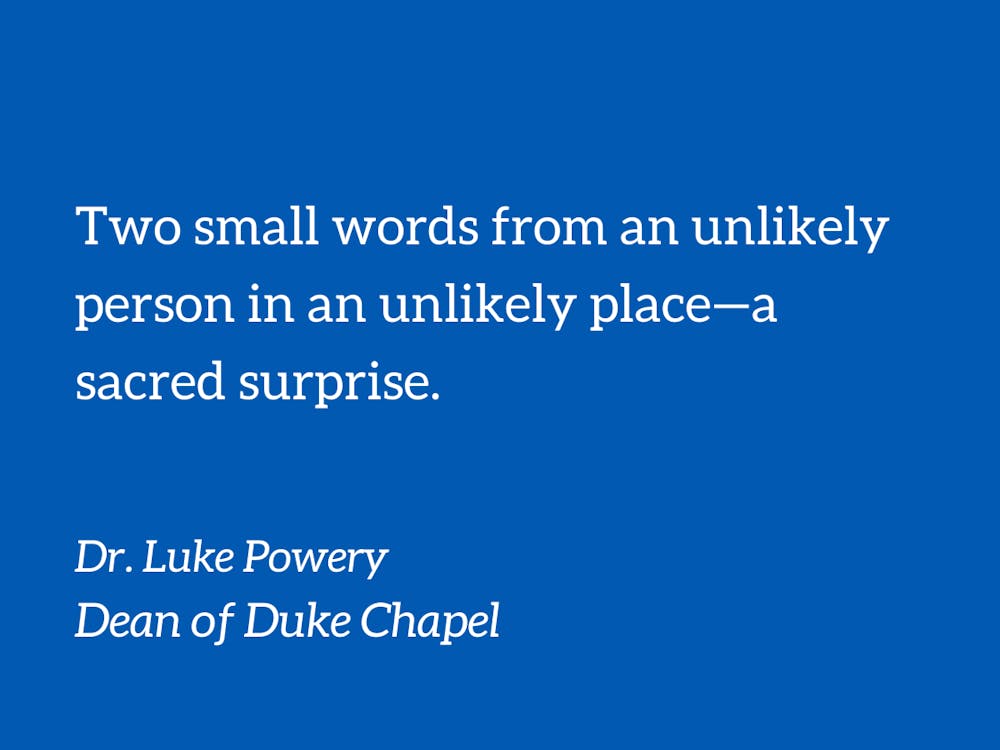If we pay attention, we can experience sacred surprises.
I say this because there’s a sentence in the Bible that points to this possibility. “The word of God came to John son of Zechariah in the wilderness.” This passage tells us that a divine word came to an unlikely person in an unlikely place—John the Baptist in the wilderness. In ancient times, John the Baptist was known to be the kind of guy who makes fashion statements by wearing camel’s hair and eating locusts with wild honey. He would not be on the Food Network nor high on your list of babysitters or presidential candidates. He was a prophet, and no one wants to hire a prophet, a marginalized figure, on the edge of society, on the borderlands of human existence.
That John the Baptist would receive a word from God is even more striking given the context in the Gospel of Luke. The gospel writer juxtaposes John the Baptist with a litany of historical figures. Luke writes, “In the fifteenth year of the reign of Emperor Tiberius, when Pontius Pilate was governor of Judea, and Herod was ruler of Galilee, and his brother Philip ruler of the region of Ituraea and Trachonitis, and Lysanias ruler of Abilene, during the high priesthood of Annas and Caiaphas, the word of God came to John in the wilderness.” The emperor, the governor, the rulers, the priests, the civic and religious leaders, the authority structures, those with power, prestige, and wealth, the dealmakers of the day, the death wielders of the day, the powerbrokers of the day, the glamour and glitz gurus of the day—none of them receives the divine word. The word comes to someone we least expect, someone we’ve written off because they don’t talk right or act right or look right, they don’t have the right calling card or the right immigration paperwork, or the right educational degree or political affiliation.
In our modern-day wildernesses, the divine word can be in the mouth of someone like a man I met named Clackston. I didn’t know that was his name initially because when I first spoke to him and asked him his name, he just said, “Get out of here, get out of here.” He said that because he had come to believe that was his name since that’s what everybody told him—“get out of here.” Here was a man who managed life with mental health issues and was often deemed non-human. He was in a wilderness. And yet, he was uttering a prophetic word critiquing how our society can demonize difference and label some people as outsiders to the point of giving a fellow human being the name “get out of here.”
In unlikely places through unlikely people, a sacred word can come and be spoken, and we ought to be surprised.
In December 2005, my 10-year-old niece Christiana, the baby girl of one of my older brothers, died from a rare auto immune disease. “Juvenile dermatomyositis” is a long name for a disease that shortened her young life. There is no cure. One organ at a time stopped functioning. She was an athlete, who at the worst point couldn’t even put on a T-shirt or lift a towel off of a rack, or open a jar, because she was too weak. Her spirit was willing, but her body was weak. Her IV needles were her nails, her hospital bed, her cross.
In the midst of this tragedy, she kept a journal. She prayed for her own healing but many times at the end of journal entries she would pray for others. She prayed for her Aunt Gail, my wife, who was pregnant at the time; her uncle JM who was in the hospital; and for “the little baby next door in the hospital with the unknown liquid inside her body.” But there came a point when she couldn’t write in her journal anymore because she was too weak. And on the last day she could muster up enough strength to write, she was praying for other people. Her last two words in the journal are the beginning of a prayer—“also touch.” That’s how it ends. “Also touch.” It’s an open-ended prayer for the world, for you and me. Two small words from an unlikely person in an unlikely place—a sacred surprise.
May your week be full of surprises that are full of the sacred.
The Rev. Dr. Luke A. Powery is Dean of Duke University Chapel. His column runs on alternate Mondays.
Get The Chronicle straight to your inbox
Signup for our weekly newsletter. Cancel at any time.

